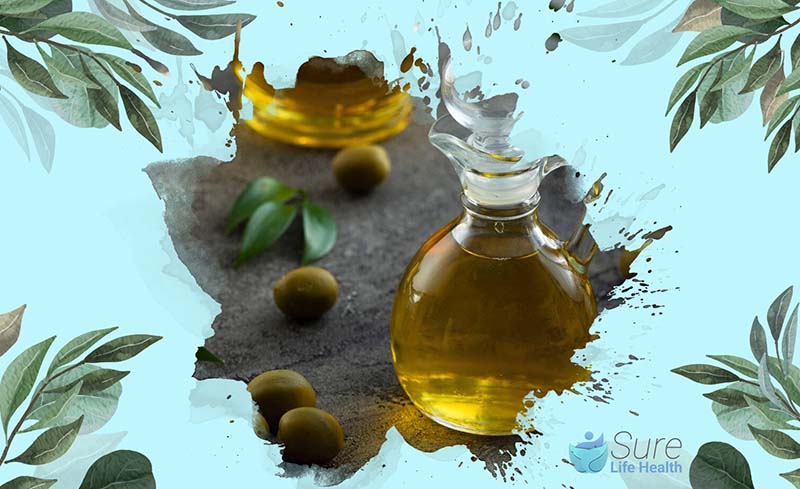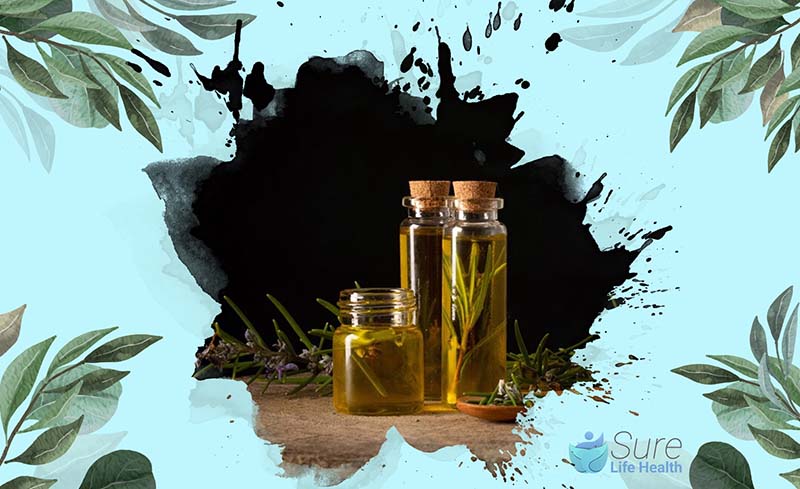Does Olive Oil Help Hair Grow? Traditionally seen as a mere culinary staple, olive oil has recently gained prominence in the realm of hair and skin care. This versatile oil is celebrated for its potential beauty benefits, although scientific research in this area remains somewhat sparse.
The basis for olive oil’s reputation as a beneficial hair care product lies in its rich composition, including oleic and stearic acids. These fatty acids are known for their health advantages when included in the diet and are believed to similarly nourish hair when applied directly.
Is Olive Oil Good for Hair Growth?
While olive oil is praised for various health and beauty applications, its efficacy in promoting hair growth remains unconfirmed by human clinical trials. The potential for olive oil to influence hair growth was suggested by a small study on mice, where topical application of oleuropein—found in higher concentrations in olives and olive leaves—led to increased hair growth. However, extrapolating these findings to human hair growth is challenging due to several factors:
- Olive oil contains significantly lower amounts of oleuropein compared to olives or olive leaves.
- The biological differences between mouse skin and human scalp.
- The impracticality of absorbing sufficient oleuropein through the human scalp from topical olive oil application due to its low concentration.
In the absence of robust scientific evidence, the primary benefit of olive oil for hair is its moisturizing properties. The high content of fatty acids in olive oil helps hydrate the hair, effectively reducing breakage and improving overall hair health.

The Research About Olive Oil and Hair Health
A notable 2015 study involving mice indicated that ingredients derived from the olive tree could promote hair growth. While intriguing, this research doesn’t fully translate to human hair growth nor does it confirm that olive oil alone would have the same beneficial effects.
What is clear is that olive oil, produced from the Olea europaea tree, primarily consists of a fatty acid known as oleic acid. This component is rich in antioxidants, which are believed to potentially mitigate hair loss effects.
Additionally, olive oil and related products are recognized for their antibacterial properties, which could contribute to maintaining a healthy scalp environment.
There is also evidence suggesting that olive oil can help in reducing and preventing the occurrence of split ends, enhancing the overall health and appearance of hair.
Although direct evidence linking olive oil to accelerated hair growth is lacking, its protective and nourishing properties can improve hair’s health and appearance, possibly leading to the perception of quicker growth.
4 Potential Benefits of Olive Oil for Hair
While the direct impact of olive oil on hair growth remains unproven, its inherent properties offer promising benefits for hair and scalp health, though further investigation is needed to confirm these effects under various conditions:
Olive Oil Has Anti-inflammatory Effects
Rich in phenols, olive oil exhibits anti-inflammatory properties comparable to Ibuprofen when consumed. However, its effectiveness as a topical anti-inflammatory agent on the scalp remains unproven.
Further research is necessary to determine whether it can alleviate scalp conditions like inflammation, irritation, or tenderness.
Olive Oil Has Antioxidant Properties
Exposure to sunlight can harm your hair and scalp due to UV radiation. Olive oil, laden with natural antioxidants, could potentially reduce oxidative stress and prevent some UV damage to your hair, and might even offer some protection against skin cancer on the scalp.
While these benefits have been observed in animal studies, further human studies are needed to verify these findings.
Antibacterial Olive Oil
Olive oil has shown antimicrobial properties in lab tests, including action against fungi like candida, which it reduced by 50% in one study. This suggests a potential role in preventing or treating fungal scalp conditions such as dandruff or seborrheic dermatitis.
However, more research is necessary to confirm its effectiveness on the human scalp and to address concerns that olive oil might exacerbate certain fungal conditions by feeding the yeast responsible for them.
Olive Oil Helps Moisturize and Soften Hair
The fatty acids in olive oil serve as excellent emollients, softening and moisturizing the hair and scalp. They create a protective layer around hair strands, reducing breakage caused by friction and sealing the hair cuticle to retain moisture longer.
Does Olive Oil Have Potential Side Effects?
Olive oil is widely recognized as a safe and beneficial addition to both your diet and skincare routine. It’s seldom associated with any significant skin irritation when applied topically or consumed. While allergic reactions to olive oil are possible, they are typically rare and mild in nature.
However, due to its high fatty acid content, overusing olive oil on your scalp and hair might lead to excessive oiliness. This can block pores and potentially trigger conditions like scalp acne or folliculitis, especially if your hair is naturally oily. To prevent these issues, it’s advisable to use olive oil sparingly if you have oily hair types. Always ensure to cleanse your scalp thoroughly with a good shampoo after applying olive oil to your hair.
Note: For those using olive oil as a hair treatment, consider blending it with other ingredients like honey or yogurt to mitigate its greasy effect while enhancing its nourishing properties. This can help you harness the benefits of olive oil without overburdening your hair and scalp.

How to Use Olive Oil for Hair
Incorporating olive oil into your hair care routine offers multiple benefits, particularly for those with dry or brittle hair. While there’s no concrete evidence that olive oil promotes hair growth, it is excellent for softening, moisturizing, and conditioning your locks:
- Scalp Massage: Start by warming a few drops of olive oil in your hands. Gently massage the oil into your scalp to stimulate and nourish the roots. Use a fine-toothed comb to distribute the oil evenly along your hair strands. Since olive oil can stain, it’s wise to protect your clothes and furniture by wrapping your hair in a towel or using a shower cap.
- Hair Mask: Create a hair mask by mixing olive oil with other essential oils known for their hair benefits. Rosemary oil is renowned for promoting hair thickness, while peppermint oil can invigorate the scalp. Apply the blend to your hair, leave it for about 30 minutes, and then wash it out thoroughly.
- Treatment for Split Ends: If you’re dealing with split ends, apply olive oil just to these areas rather than your entire head. This targeted application prevents the scalp from becoming overly greasy and allows the oil to work intensively on repairing your ends. Leave the oil on as long as needed before shampooing.
Who Is Olive Oil Suitable for?
Olive oil is great for people with curly, thick, or rough hair that tends to get frizzy or dry. Using olive oil can help make your hair softer and less frizzy. But, if your hair is thin or straight, you might want to skip it because it can make your hair heavy and oily.
Also, if you have dandruff, it’s best not to put olive oil in your hair. It can make the dandruff worse by holding onto dead skin and extra moisture.
Can Olive Oil Be Used Directly on Hair?
Yes, you can use pure olive oil directly on your hair without having to mix it with anything else. It’s gentle and usually doesn’t irritate your scalp or cause any burns.
Olive oil can also be used as a carrier oil, meaning you can mix it with other essential oils to make them safer and easier to apply to your hair.
Conclusion
In conclusion, despite its known moisturizing benefits, the effectiveness of olive oil in promoting hair growth remains unproven. Addressing the question “Does olive oil help hair grow?” requires more scientific research.
However, its fatty acids and antioxidants can enhance hair health and appearance. Those considering olive oil for hair care should use it moderately, particularly if they have oily scalps. This guide helps you decide if olive oil is suitable for your hair type and needs.
Be sure to explore more insightful blogs from Sure Life Health, where we continue to shed light on the latest trends and breakthroughs in health and wellness.
Professor Gaye Cunnane, PhD, MB, FRCPI
As the Director of Health and Wellbeing at RCPI, Professor Gaye Cunnane is at the helm of initiatives aimed at enhancing the health and well-being of RCPI Trainers and Trainees. Her role extends beyond administration; she is also a respected clinical professor of rheumatology and a consultant rheumatologist at Trinity College Dublin (TCD) and St James’s Hospital. Prof. Cunnane’s medical journey began at TCD, where she graduated from medical school, and her path has been marked by both clinical and academic excellence.
After completing her basic clinical training in medicine, she embarked on PhD studies at University College Dublin and St Vincent’s University Hospital. Her research during this period was focused on prognostic markers in early inflammatory arthritis, a project that saw her collaborating with esteemed universities across Europe, including in Switzerland, The Netherlands, the UK, and Sweden.
Prof. Cunnane’s career took her to the University of California, San Francisco, where she spent three years delving into research on new treatments for lupus. Her academic prowess led her to the University of Leeds in 2001 as a senior lecturer, before returning to Ireland in 2003 to assume her current roles. She has also served as the National Specialty Director for Rheumatology training in Ireland, Programme Director for Basic Specialist Training with RCPI, and as a past President of the Irish Society for Rheumatology.
PUBLISHED ARTICLES
“Rheumatic disease differentiation using immunoglobulin G sugar printing by high-density electrophoresis”: Published in The Journal of Rheumatology, this study reflects her in-depth investigation into rheumatic diseases.
“Benefits of exercise in patients with rheumatoid arthritis: a randomized controlled trial”: This research work, highlighting the positive impact of exercise on rheumatoid arthritis, underscores Prof. Cunnane’s dedication to practical, patient-centered research.
Additionally, Prof. Cunnane has made notable contributions to the Annals of the Rheumatic Diseases, discussing early referral, diagnosis, and treatment of rheumatoid arthritis. She has also been involved in a study on the NCBI platform investigating exercise benefits in rheumatoid arthritis patients.
Professor Gaye Cunnane’s career is a testament to her commitment to improving patient outcomes in rheumatology through rigorous research, clinical excellence, and dedicated teaching. Her work continues to influence the field of rheumatology, both in Ireland and internationally.

